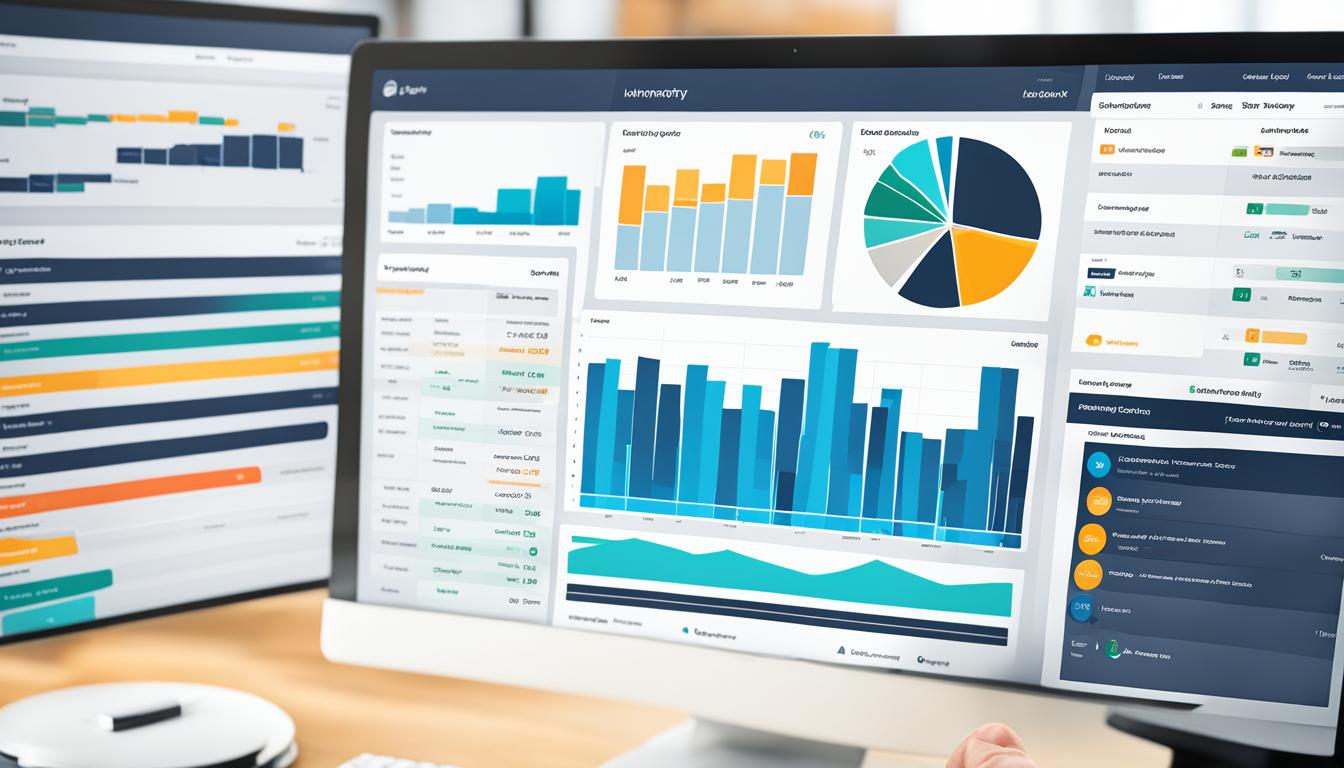Inventory management software solutions streamlining stock control and optimizing supply operations
In today’s fast-paced business world, managing inventory well is key for companies in many fields. Inventory management software has become a vital tool. It helps companies manage their stock better, make their supply chains more efficient, and run their operations smoothly. These software tools give a clear view of what’s in stock, automate ordering, and offer detailed analytics for better decisions.
Key Takeaways
- Inventory management software solutions offer real-time visibility into inventory levels and automate reordering processes.
- These platforms provide comprehensive analytics to support strategic decision-making and optimize supply chain operations.
- Inventory management software is used by professionals across various industries, including retail, construction, manufacturing, and electronics.
- The software is typically priced on a per-month basis, with entry-level plans averaging around $262 per month and premium subscriptions averaging around $2,181 per month.
- Effective inventory management helps businesses reduce stockouts, minimize overhead costs, and improve customer satisfaction.
What is Inventory Management Software?
Inventory management software is a key tool for businesses to manage their stock better. It gives real-time updates on what’s in stock. This ensures accurate reports and shares important data across different places. It helps in making the right amount of goods, managing stock, and fulfilling orders smoothly.
Key Features of Inventory Management Software
This software has many features to improve stock control and make supply chains more efficient. Some main features are:
- Inventory Tracking: It keeps a close eye on stock levels, tracking how much is in stock, where it is, and where it moves.
- Product Identification: It makes it easy to identify and sort products. This helps in better managing and understanding stock data.
- Inventory Optimization: It uses past data and sales trends to help businesses decide on stock levels, ordering, and forecasting.
This software focuses on improving how orders and forecasts are handled. It aims to make the supply chain run smoothly and efficiently.
“Effective inventory management is a critical component of a successful business. Inventory management software provides the tools and insights needed to optimize inventory levels, reduce waste, and streamline operations.”
Benefits of Effective Inventory Management
Using an efficient inventory management software can bring great benefits. These tools help you get products to customers faster. They also give insights for better ordering and make managing inventory easier. Here are some main advantages:
- Cost Savings: This software helps you order the right amounts at the right times. This can greatly reduce costs from too much stock, spoiled items, and outdated products.
- Labor Productivity: Automating inventory tracking and restocking frees up your team. They can then focus on tasks that add more value, making them more productive.
- Warehouse Efficiency: Seeing where stock is and how it moves helps manage warehouses better. This means using space well and avoiding too much or too little stock.
- Customer Satisfaction: With accurate and fast order fulfillment, customers are happier. This leads to more loyalty.
Choosing a strong inventory management system changes how your business runs. It leads to saving money, increasing productivity, making warehouses run better, and making customers happier.
Inventory Management Software Solutions
For businesses of all sizes, managing inventory well is key. The right software can really help. It makes managing stock and improving supply chain easier.
These software solutions work well with big ERP systems. They make sure information flows smoothly across different parts of the business. When looking at inventory management software, think about these important things:
- ERP Integration: Make sure the software works well with your ERP system. This helps with accurate data, less manual work, and better efficiency.
- Cloud-based Software: Cloud-based software lets you access it from anywhere. It also updates automatically and grows with your business.
- Analytics and Visibility: Having advanced analytics and real-time data helps you make smart choices. It shows you what’s in stock, supply chain steps, and what customers want.
- AI-driven Features: New software uses AI for things like predicting trends and giving smart advice. This helps make inventory management better.
“Effective inventory management software not only optimizes stock control but also provides valuable insights to drive strategic business decisions.”
By looking at these key points, businesses can pick the best inventory management software. It should fit their specific needs and help them grow.
Challenges and Considerations
Managing inventory well is key for businesses, but it comes with hurdles. Stockouts, when products sell out, can lead to lost sales and unhappy customers. On the other hand, overstocking can use up a lot of money and raise storage costs.
Getting the inventory right means having a clear view of the supply chain and precise inventory data integration. Finding the right inventory management software that fits with current systems is hard. Issues with compatibility and moving data over can make it tough to start using it.
Security is also a big deal. Companies need to make sure their inventory management software keeps data safe and follows the rules. Not getting good support from the software company can make it hard to use and keep using these systems.
Before picking an inventory management software, businesses should look at what it offers, how it works, and the total cost. Taking the time to tackle these inventory management challenges can improve supply chain operations and boost profits over time.
“Effective inventory management is the backbone of a successful supply chain. Addressing common challenges like stockouts and overstocking is crucial for maintaining a healthy bottom line.”
Key Industries and Users
Inventory management software is key for businesses in many fields. It helps with managing materials, work in progress, and finished products. This includes retail, consumer goods, food, and ecommerce sectors.
Professionals use this software to keep track of stock, manage finances, and improve warehouse work. It does more than just track stock. It automates tasks, cuts down on mistakes, and helps make better decisions for growth.
For manufacturing, there’s special software. It’s made for the complex needs of production planning and supply chain management. These tools offer advanced features to help manufacturers overcome their unique challenges.
“Inventory management software has been a game-changer for our retail business, allowing us to streamline operations, reduce waste, and better serve our customers.”
For all industries, managing inventory well is key to staying ahead. It helps with supply chain efficiency and boosts profits. With the right software, inventory management software users can work more efficiently and understand their operations better.
Conclusion
Using inventory management software is now key for businesses wanting to improve their operations and grow. These tools give businesses real-time updates on their stock, automate important tasks, and help make better decisions with data.
Inventory management has many benefits. It helps save money, makes workers more productive, and makes customers happier. It also helps businesses stay ahead in the market by keeping their supply chains tight and inventory just right. This way, they avoid big problems, cut down on waste, and focus on what really matters for growth.
As things change fast and customers want more, using inventory management software is what top companies do. By using these new technologies, businesses can work better, faster, and stronger. This puts them in a great spot for success as the business world keeps changing.



